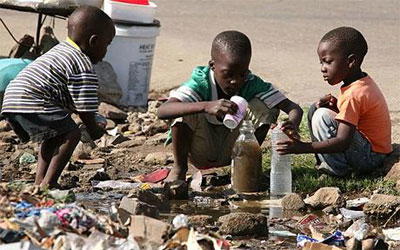The UN Children’s Fund (UNICEF) says Nigeria has the second-highest number of cases of cholera outbreak in West and Central Africa.
UNICEF Regional Director for West and Central Africa, Gilles Fagninou, said on Wednesday that the cholera outbreak in Nigeria had become endemic.
“Cholera remains endemic in Nigeria, with the country experiencing recurrent major outbreaks in recent years.”
“As of end of June, Nigeria recorded 3,109 suspected cholera cases and 86 deaths across 34 states,” Fagninou said.
The UN official added that the figure made Nigeria the second most affected country in the West and Central Africa region.
He noted that the cholera outbreak in the West and Central African region posed a crisis for children.
He said some 80,000 children were estimated to be at high risk of cholera in West and Central Africa as the rainy season began across the region.
According to him, the heavy rains, widespread flooding and the high level of displacement are all fuelling the risk of cholera transmission and putting the lives of children at risk.
He explained that cholera was an acute diarrhoeal infection caused by consuming food or water contaminated with bacteria. The disease can be treated with oral rehydration solution and antibiotics, but can be fatal within hours if untreated.
“Young children are particularly vulnerable to cholera due to factors such as poor hygiene, inadequate sanitation and access to safe water and a greater risk of severe dehydration.
“The Democratic Republic of the Congo (DRC) is the hardest hit country in the region, reporting more than 38,000 cases and 951 deaths in July.
“Children under five years now account for nearly 26 per cent of cases in the DRC, and without stronger containment measures, they may face the worst cholera crisis since 2017, the UNICEF official said.
He added that Chad, the Republic of Congo, Ghana, Côte d’Ivoire and Togo were also facing ongoing epidemics.
Fagninou also said that Niger, Liberia, Benin, the Central African Republic and Cameroon were also under close surveillance due to their vulnerability.
He stated that urgent and scaled-up efforts were necessary to prevent the further spread and contain the disease across the region.
He revealed that UNICEF had delivered life-saving health, water, hygiene, and sanitation supplies, as well as treatment facilities, to communities since the outbreak.
“The agency has also supported cholera vaccinations, scaled up preparedness and response efforts and encouraged families to seek timely treatment and improve their hygiene practices.
“We are in a race against time, working hand in hand with the authorities to deliver essential healthcare, safe water and proper nutrition to children already at risk of deadly diseases and severe acute malnutrition,” Fagninou stressed.
“Together with an array of partners, we are strengthening community engagement and extending our reach to remote and underserved areas, making every effort to ensure that no child is left behind,” Fagninou said.
He added that UNICEF West and Central Africa urgently required $20 million over the next three months to scale up critical support in health, WASH, risk communication and community engagement.
The post Cholera still endemic in Nigeria – UNICEF appeared first on Vanguard News.

